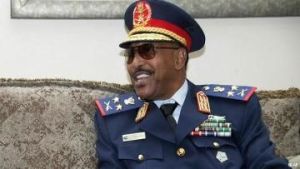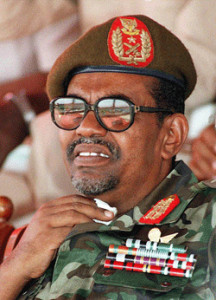“Bombing Civilian Hospitals: A Khartoum ‘Tradition'”: further reflections on the repeat bombing of the MSF hospital at Frandala, South Kordofan
(from The Huffington Post, 23 January 2015)
http://www.huffingtonpost.com/eric-reeves/bombing-civilian-hospital_b_6531520.html
If we judge by historical experience, the January 20 bombing of the Doctors Without Borders/Médecins Sans Frontières (MSF) hospital in Frandala, South Kordofan (Sudan) will provoke a few angry words of condemnation—an then the incident will be over. No matter that a modern, accurate, militarily advanced jet aircraft was used in the attack, and that the location of the hospital was well known to the Khartoum regime that ordered the bombing. Indeed, the hospital was previously bombed in June 2014—after MSF had provided Khartoum with their precise location coordinates.
That attack came six days after U.S. ambassador to the UN, Samantha Power, had condemned in particularly forceful terms the attack on the Mother of Mercy Hospital near Kauda in the Nuba Mountains of South Kordofan on 1 May 2014. The first bombing of the MSF hospital in Frandala was Khartoum’s retort to Power’s escalation of rhetoric—and we heard nothing more from anyone in the Obama administration after the attack on MSF, winner of the 1999 Nobel Peace Prize and one of the world’s most important and courageous medical relief organizations.
The details of the MSF press release (22 January 2015) are not only chilling, but at the same time raise serious questions about international willingness to confront the Khartoum regime over even the most egregious war crimes. Of course both President Omar al-Bashir and Defense Minister Abdel Rahim Mohamed Hussein have been indicted by the International Criminal Court for crimes against humanity—al-Bashir has been further charged with multiple counts of genocide in Darfur. Conspicuous lack of support for the ICC from the UN Security Council, however, has recently led the chief prosecutor, Fatou Bensouda of Gambia, to “hibernate” the Darfur criminal investigation and prosecution.
Defense Minister Abdel Rahim Mohamed Hussein, indicted by the International Criminal Court for crimes against humanity in Darfur; he is the official ultimately responsible for the military orders to attack the MSF hospital
President and Field Marshal Omar al-Bashir, indicted by the ICC for crimes against humanity and genocide in Darfur
Excerpts from the MSF press release
A hospital operated by the international medical humanitarian organization Doctors Without Borders/Médecins Sans Frontières (MSF) was directly targeted in an aerial bombing in Sudan on January 20, forcing the suspension of medical activities, MSF announced today [22 January 2015]. The hospital, located in the Nuba Mountains village of Frandala in the South Kordofan region of Sudan, was bombed by the Sudanese Air Force (SAF). Repeated and targeted bombings in the region prevent the safe operation of medical activities, depriving the local population of lifesaving care…
“With more than 100 patients present, we were very lucky not to have more casualties because people simply had no time to seek protection. Everyone is shocked and frightened of further attacks.”
Approximately 150 patients and staff were in the hospital when a SAF fighter jet [almost certainly a Sukhoi-24 air-to-ground attack plane] dropped a cluster of 13 bombs, two of which landed inside the hospital compound. The others struck just outside the hospital fence. One MSF staff member and one patient were injured. The property also suffered damage… [The Mother of Mercy Hospital was also attacked by a fighter jet from Khartoum’s air force, identified from its profile by Dr. Tom Catena, surgeon at the hospital, as a Sukhoi-24—ER.]
The Frandala hospital was previously bombed in June 2014. That attack took place despite the Sudanese government’s knowledge of the hospital location and its activities, which had been previously communicated to the authorities by MSF. One patient was killed in the attack and several others were wounded. The hospital also sustained significant damage. MSF publicly condemned the attack and demanded respect of medical facilities….
MSF is one of the few health care providers in South Kordofan. The MSF facility in Frandala, featuring outpatient and inpatient wards, began operating in 2012. Nearly 80,000 consultations have been performed, along with close to 4,000 hospitalizations.
So what will follow? More “condemnations” from voices like Power’s? It’s all we should expect, despite the fact that such bombings over the past three and a half years have brought a million people in South Kordofan into desperate condition, many badly malnourished, many more displaced—and this is to say nothing of Blue Nile and Darfur.
Clarity or expediency?
If we want moral clarity in understanding the Khartoum—as opposed to the political “complexities” adduced whenever the regime is the subject—then let us look to Frandala. This deliberate bombing attack on an MSF hospital, by an advanced military jet aircraft, is the very face of the Khartoum regime. It is what the world should see when it looks at these men. Instead, the feckless Europeans, with only a couple of exceptions, accept the legitimacy of the regime and several have done substantial commercial business with it, at least before the collapsing Sudanese economy made the regime’s ruthless survivalists even more desperate to do whatever it takes to maintain their monopoly on national wealth and political power. In the process they’ve made further commercial investment highly unlikely, and the economy will sink even more quickly.
The political collapse of the regime should be an explicit policy goal. But the Obama administration, in its lust for putative counter-terrorism intelligence, has moved Sudan policy from the State Department to the burgeoning and ever more influential intelligence community in Washington. These administration figures know well that despite the savagery of the attack on MSF’s hospital, it was nothing new. Such attacks go back two decades, well before the end of the ghastly and catastrophically destructive 22-year north/south civil war (see www.sudanbombing.org).
Moreover, it has been with full knowledge of the nature of Khartoum’s conduct of war that the two previous Obama administration special envoys to Sudan have rendered their assessments of the regime. Former Major General Scott Gration (a particularly strong advocate for Obama among the military during the 2008 presidential election) and veteran diplomat Princeton Lyman made revealing “trademark” statements during their tenures.
The wildly unqualified Gration made news in his first months as special envoy by explaining his way of dealing with a regime of génocidaires:
“We’ve got to think about giving out cookies,” said [Scott] Gration, who was appointed in March. “Kids, countries–they react to gold stars, smiley faces, handshakes, agreements, talk, engagement.” (Washington Post [el-Fasher, Darfur], 29 September 2009)
This was several months after Khartoum had expelled thirteen of the world’s finest humanitarian organizations from Darfur—roughly half the capacity in the field at the time, a capacity that has never come close to being replaced. Today, humanitarian shortcomings are felt virtually everywhere in Darfur, and in some locations substantial losses of relief capacity are producing significant mortality, especially among children.
Gration was merely foolish and ignorant, although he is widely regarded as having been enormously destructive during his tenure. But the more sinister comments and views within the Obama administration are those that echo the view expressed by former special envoy Princeton Lyman (from an interview with Asharq Al-Awsat, a distinguished English-language Arabic news source, on 3 December 2011). This was after Khartoum had initiated military hostilities in South Kordofan (5 June 2011) and Blue Nile (1 September 2015), and militarily seized the significant Abyei region on the north/south border (21 – 22 May 2011), a clear contravention of the landmark 2005 Comprehensive Peace Agreement between Khartoum and the South.
Asharq Al-Awsat: “Are you calling for the Arab Spring to encompass Sudan as well?”
Lyman: “This is not part of our agenda in Sudan. Frankly, we do not want to see the ouster of the [Sudanese] regime, nor regime change. We want to see the regime carrying out reform via constitutional democratic measures.”
The notion that a regime that makes a practice of bombing hospitals and schools, that imposes humanitarian embargoes or restrictions on millions of its own people, that has committed genocide in Darfur as well as the Nuba Mountains (both currently and in the 1990s), and that has abrogated every agreement it has signed with a Sudanese party or movement—that such a regime can preside over “reform via constitutional democratic measures” is so utterly preposterous as to defy explanation. Our only recourse is to translate this as a bizarre example of “diplomatese”: “we don’t want to see this regime go because we’re happy with the relationship we have concerning counter-terrorism intelligence; but of course we will make all the appropriate noises about political freedom, democracy, rule of law, and the nastiness of war, etc.”
Given such congenial comments by the Obama administration’s special envoys for Sudan, Khartoum—we may be sure—will continue its aerial savagery without hesitation or second thoughts.
[Eric Reeves, a professor at Smith College, has published extensively on Sudan, nationally and internationally, for the past fifteen years. He is author of Compromising with Evil: An archival history of greater Sudan, 2007 – 2012 (September 2012)]

